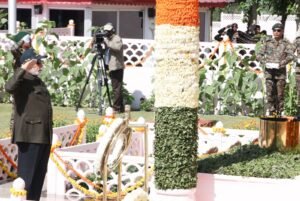Last Updated on October 6, 2020 at 8:34 pm
The Indo-China engagement which started in May has not ended yet and many senior retired officials believe that if the engagement continues it could lead to war between both the nations.
The seniors believe that Indian Intelligence has failed and the Indian soldiers have to face the consequences. The Doklam incident of 2017 was also a failure of Indian Intelligence, the officials believe. Now both the nations have agreed on a policy of deploying a fewer number of troops along the Line of Actual Control (LAC).
From the past, the local officials in Ladakh have been trying to alert the Central Government about the Chinese movement into the Indian territory and this proves the negligence from India’s Intelligence.
In 2015 the Chinese government planned to construct a belt and road along with the border and for that, the People’s Liberation Army formed the Western Theatre Command (WTC) to meet with their biggest enemy, the Indian army. The challenge that PLA faced was how to bring WTC with arms and ammunition without being viewed as aggressors against the 2 lakh Indian soldiers guarding the border as it will impact the bilateral agreements signed between India and China in 1933 and 1996. According to the agreement, both the nations committed to keeping an equal number of soldiers along with arms and ammunition. Not only this, but the armies of both the countries were supposed to not perform any military exercise without the consent of each other.
In 1950 when Indian and Chinese soldiers engaged in a minor clash, China laid a claim to the significant areas in the Indian territory along the LAC. At that time too the Central Government followed the agreement and sent small groups of army with fewer arms and ammunition. The Chinese PLA took the opportunity and attacked the Indian army. With less ammunition, the Indian army fell in October 1962 and the Chinese army captured a major part of Indian territory. The town of Tezpur in India’s north-east had to be evacuated at the earliest because of the advancing Chinese Forces.
India doesn’t seem to be learning from the previous security failures and the ease with which china invaded India’s territory in Galwan valley is an example of India’s negligence towards China. Looking at the negligence by the Indian government, the Chinese army announced a unilateral cease-fire and took their territory and other areas back that were with the Indian Army in 1962. The Indian side was only able to retain the Aksai Chin plateau which has an area equal to the size of Switzerland. Now the question arises how India’s policymakers can allow such a colossal error of judgment and why India’s intelligence is still neglecting China’s ill-practices.
Similarly, India’s intelligence failed in 1999 when Pakistani Army made several invasions. On 3 May 1999, an Indian shepherd informed the local authorities about the Pakistani Army movement. But the military and intelligence ignored several warnings from the locals. As a result of this Pakistan advanced 2,000 soldiers who captured about 62-mile stretch land which was 6 miles deep within the Indian Territory. In order to dislodge the enemies from the heights which they have occupied the Indian army called for the air force for support. The Army got delayed in sharing intelligence with the Air Force which delayed the involvement of the air force in war.
In February and March, India’s Intelligence agencies didn’t report suspicious Chinese army movement towards Ladakh as a result Chinese forces occupied major areas in Ladakh thus cutting Indian patrol posts from each other and also blocked the major roads connecting the mountain regions. Till the time the Indian government received intelligence the only option that was left was to move the soldiers from Leh and deploy them along the LAC. If the intelligence system of India was more effective than the Indian Forces would have received much information about the movement of the Chinese Army and could have blocked the attempts by the Chinese army to make incursions.
According to the reports on Sunday Indian National Security Adviser Ajit Doval had a telephonic conversation with China’s Foreign Minister Wang Yi. Both representatives are assigned to resolve the border dispute between both countries. Doval and Wang agreed that the dispute along the LAC needs to be resolved at the earliest and de-escalation of soldiers from the Indo-China Border to restore peace and stability.
An Indian official said “both the countries ensured a phased and step-wise de-escalation of soldiers from the border. Both the representatives affirmed that the soldiers of both countries should strictly respect the Line of Actual Control. Both the Nations have also agreed to work together so that such engagements don’t occur in the coming future that can disturb the peace and tranquility on the Border”.
Also Read: These are Indian Army’s preparations to beat chill and China in Ladakh
Also Read: Double humped camels to be deployed along Indo-China border amid rising tension
Also Read: China must not underestimate battle-hardened Indian army in Ladakh



